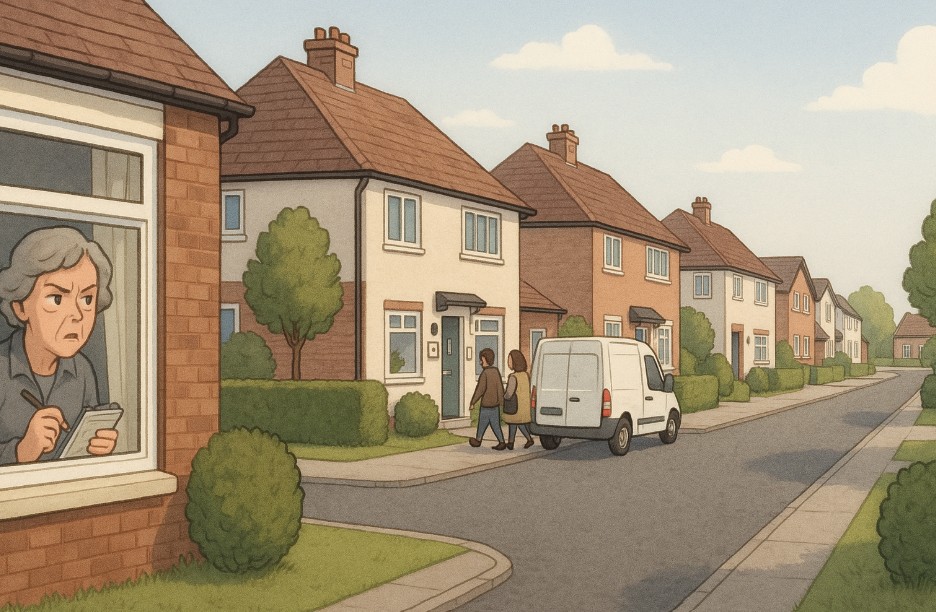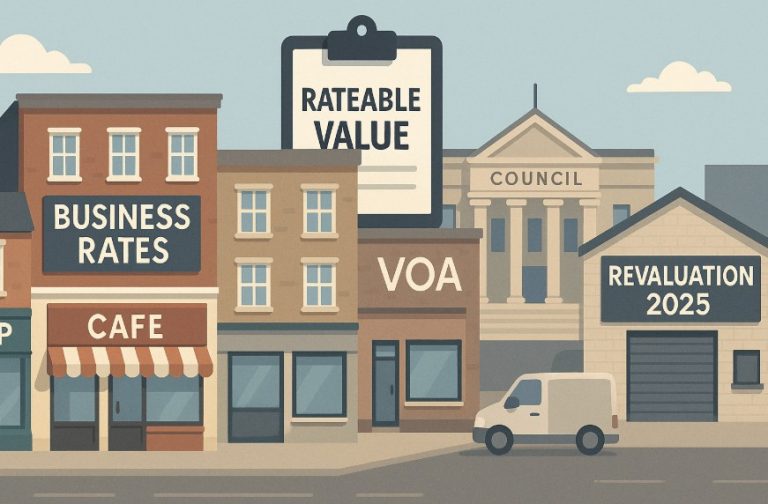How to Report Neighbour Running Business from Home in UK?
The UK has seen a sharp rise in home-based businesses, with nearly 3 million now operating nationwide. While most are legitimate and unobtrusive, some can cause disruptions to the surrounding community.
These may include increased traffic, excessive noise, unauthorised structural changes, or breaches of local planning rules.
A home business that crosses certain legal boundaries or creates a nuisance can and should be reported. This guide explains how to report a neighbour running a business from home in the UK, what to expect from the process, and how to ensure your concerns are handled effectively and lawfully.
Understanding the Legal and Regulatory Requirements

Operating a business from home involves more than setting up a desk and internet connection. There are multiple legal layers to consider, and business owners must ensure compliance from the outset.
One of the most important considerations is planning permission. If the nature of the business materially changes the use of the home, from a private residence to a place of trade or service, the owner may need approval from the local planning department.
This is particularly true for businesses that involve staff or customers visiting the premises, structural modifications, or installation of commercial signage.
Business rates are another consideration. While many home-based businesses are exempt, you may be liable if a part of your property is used exclusively for business purposes.
For instance, converting a garage into a salon or workshop could trigger a reassessment by the Valuation Office Agency (VOA).
Certain business types also require licensing, including:
- Childcare services
- Dog breeding or kennelling
- Food preparation
- Tattooing or cosmetic procedures
- Financial and loan services
On top of this, home businesses must comply with health and safety regulations, especially if they involve employees or customer interaction. This includes fire safety, hygiene standards, and accessibility.
Insurance is equally important. Employer’s liability insurance is a legal requirement if someone works for the business, even on a part-time basis.
Public liability, professional indemnity, and product liability insurance may also be necessary, depending on the business model.
Compliance with these regulations protects not only the business owner, but also their clients, neighbours, and the broader community.
What Are the Different Scenarios for Home-Based Business Setup?
The rules around home-based businesses vary depending on the property type and ownership model. Understanding how your living situation affects your rights and responsibilities is crucial.
Council Properties: Tenants in council or housing association homes must obtain formal permission from their local authority before operating a business. The council will consider factors such as potential nuisance to neighbours, use of shared areas, and whether the property is being altered inappropriately.
Privately Rented Homes: Renters must seek written consent from their landlords. Tenancy agreements often include clauses that prohibit running a business without prior approval. Even if permitted, the landlord may impose conditions or choose not to renew the tenancy if the business causes damage or complaints.
Mortgaged Homes: If the property is mortgaged, the lender should be informed. Many residential mortgages prohibit commercial use without consent, and breaching terms can lead to penalties or even repossession. Property deeds should also be reviewed for restrictive covenants.
Outbuildings and Extensions: Garden offices, garages, and sheds used for business may require planning permission, particularly if they involve regular visitors or significant modifications. Business owners must also check if such structures fall under building control regulations.
Each of these scenarios carries different levels of scrutiny and obligation. Failing to comply can lead to disputes, eviction, or enforcement action depending on the property’s ownership and regulatory framework.
What Are the Signs of a Disruptive Home Business?
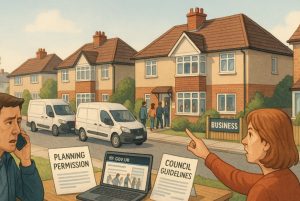
Many home-based businesses operate quietly and legally without impacting their neighbours. However, certain activities can create disturbances or signal that the business may be operating outside legal boundaries.
Common signs include:
- Increased foot or vehicle traffic: If multiple clients or employees are visiting daily, it could indicate a commercial use that requires planning consent.
- Noise pollution: Businesses using tools, machinery, or hosting events may produce disruptive sounds not typical of a residential setting.
- Frequent commercial deliveries: Large or regular deliveries might suggest stockpiling or retail activity requiring permission.
- Visible alterations: Structural changes to a home or outbuilding, such as signage, dedicated entrances, or commercial lighting, may breach planning rules.
- Neighbour complaints: If more than one household is affected, it’s likely that the business is exceeding acceptable residential use.
These disruptions not only impact immediate neighbours but can affect the broader community. Reporting such activity isn’t just about resolving your own issue it helps uphold regulations that protect residential living environments.
When Does a Home Business Become a Problem?
Not every business activity from home warrants intervention. However, there are clear circumstances under which a business could be considered unlawful or disruptive.
Examples of concerning behaviour include:
- Regular footfall from customers or suppliers at all hours
- Noise from machinery, tools, or commercial activity
- Parking problems caused by client or employee vehicles
- Frequent deliveries of commercial goods
- Commercial signage on a residential building
- Physical alterations to a property without permission
These issues, especially when persistent, can lead to a breach of planning regulations, tenancy agreements, or housing covenants. If such activity is interfering with your quality of life or impacting your property, it’s reasonable to raise a concern.
How to Report a Neighbour Running a Business from Home in the UK?
Reporting a neighbour’s home business may seem daunting, especially if you’re unsure whether their activities are truly unlawful.
But when a business starts to affect the peace and use of your property whether it’s due to noise, traffic, or a breach of planning rules, it’s your right to take action.
Here’s a detailed breakdown of how to approach the situation responsibly and effectively.
Step 1: Assess the Nature and Impact of the Business Activity
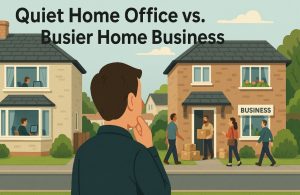
Begin by objectively evaluating the situation. Many home-based businesses are perfectly legal and run in a way that causes no disruption to the local community.
A freelance writer or web developer working quietly at a desk, for example, would rarely raise concerns.
But some types of businesses, especially those that involve client visits, use of machinery, storage of inventory, or frequent deliveries, can create real issues in residential areas. Consider the following:
- Is your neighbour receiving a high volume of visitors?
- Are there noticeable increases in traffic and parking congestion?
- Do you hear persistent noise during the day from equipment or operations?
- Is there evidence of commercial signage, banners, or business branding on the property?
- Has the property been physically altered without planning consent?
These are strong indicators that the property may be in breach of local planning regulations or creating a nuisance, and further investigation is justified.
Step 2: Keep Records and Gather Evidence

Councils need evidence to act. A vague complaint without documentation is unlikely to trigger enforcement, especially if the issue isn’t visibly disruptive. Begin recording and logging specific instances of concern to establish a pattern of disruption.
This might include:
- A written log of events, including dates, times, and descriptions of the activities
- Photos or videos showing delivery vans, customer vehicles, or structural changes
- Audio recordings of consistent noise disturbances
- Emails or text exchanges with other neighbours who are also affected
The aim is not to spy on your neighbour, but to document legitimate concerns in a clear and verifiable way. The more precise your evidence, the more effectively the council can assess and act on your complaint.
Step 3: Verify Planning Permissions or Licensing
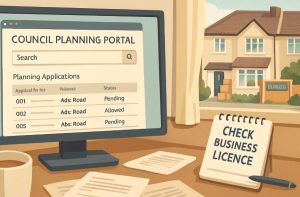
Before submitting a formal complaint, you can try to determine whether the business has any official approvals or licenses. Many councils have an online planning portal where you can search applications by address.
If you see that planning permission was recently granted for a change of use or construction (e.g., a garage conversion into a studio), that may clarify the situation.
You can also contact the local licensing team to see whether the business in question requires and has obtained a license to operate. This is especially relevant for businesses involving food, children, animals, or personal care services.
If there’s no evidence of approvals or the business seems to go beyond what was granted, a formal complaint may be necessary.
Step 4: File a Complaint with Your Local Council
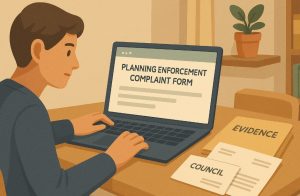
The next step is to formally notify the council. Depending on the issue, this might involve contacting:
- Planning enforcement: If the concern involves a change of property use, unauthorised extensions, or commercial signage
- Environmental health: If the business causes noise, pollution, odours, or similar nuisances
- Licensing department: If the business is unlicensed in a regulated sector
Most local authorities offer multiple ways to submit complaints:
- Online forms via the council’s official website
- Email correspondence to the relevant department
- Phone calls to the council complaint lines
- Written letters sent by post
Be as specific and factual as possible. Include:
- The full address of the property
- The nature of the suspected business activity
- A summary of how this affects you or the community
- Attached evidence such as logs, photos, or witness statements
You can choose to remain anonymous, though this may limit the council’s ability to follow up with you or gather more details if needed. Confidentiality is usually protected by default unless legal proceedings require otherwise.
Step 5: Understand the Council’s Investigation Process
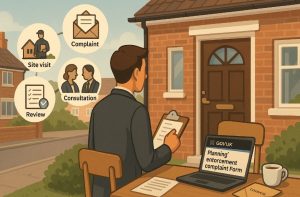
Once your complaint is filed, it will be logged and assigned to the appropriate team. The investigation process generally includes:
- Initial screening: The council will first review your complaint to determine if it falls within their scope and if it meets the threshold for investigation.
- Site inspection: A planning enforcement officer or environmental health officer may visit the property, often unannounced, to observe the activities in question.
- Dialogue with the homeowner: In many cases, the council will speak with the resident to inform them of the complaint and gather their version of events.
- Assessment and outcome: If a breach is found, the council may issue an informal warning or take formal enforcement action, such as serving a planning enforcement notice or abatement order.
Investigations can take anywhere from a few weeks to several months, depending on the complexity of the case and the council’s capacity. You may receive periodic updates or a final report once the case is closed.
Step 6: Follow Up if Necessary

If you haven’t heard back from the council after a reasonable period, you are entitled to follow up. Use the reference number (if provided) to check the status of your case.
Councils are usually open to updates or additional evidence, especially if the issue is ongoing or worsening.
If the council dismisses your complaint without action and you believe this is unjustified, you can escalate your concerns by:
- Contacting your local councillor to advocate on your behalf
- Requesting a formal review or appeal of the council’s decision
- Submitting a complaint to the Local Government and Social Care Ombudsman
This independent body reviews how councils handle complaints and can recommend corrective action if it finds poor handling or unfair decisions.
Step 7: Explore Legal Options as a Last Resort
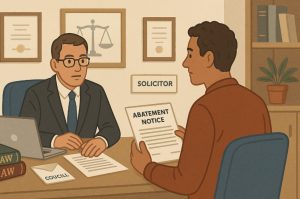
If the business continues to disrupt your living environment and all local authority avenues have been exhausted, you may consider private legal action.
Options include:
- Applying to a Magistrates’ Court for a nuisance abatement order
- Initiating civil proceedings in a County Court for loss of enjoyment, damages, or injunctions
- Consulting a solicitor specialising in property or nuisance law
Legal action can be time-consuming and costly, so it should be pursued only after attempts at resolution through dialogue, mediation, and council enforcement have failed.
Why Reporting Matters?
Reporting a problematic home-based business is not about creating conflict, it’s about maintaining a fair, lawful, and liveable community.
Residential areas are intended to provide peace and privacy, and when business operations begin to infringe on those expectations, it can affect property values, neighbourhood cohesion, and quality of life.
When one property is allowed to operate outside of legal and planning constraints, it can set a precedent that encourages others to do the same.
Over time, this could change the character of the street or estate, bringing increased traffic, noise, and pollution to areas that were never intended for commercial activity.
Moreover, reporting a business that lacks appropriate licences or planning permission can prevent broader issues.
For instance, businesses involving food preparation, childminding, or beauty treatments may pose health or safety risks if not properly regulated.
These activities are subject to oversight for a reason, and failure to comply can endanger not just neighbours, but clients or staff involved in the business as well.
By taking action, you help protect the legal rights of other residents and reinforce the standards that keep residential communities safe and functional.
Reporting ensures that councils are aware of potential issues and can intervene when necessary to enforce the law and promote harmony.
Conclusion
Reporting a neighbour for running a business from home is a serious but sometimes necessary step to protect your living environment.
While many home businesses operate within the law, those that cause regular disturbance or operate without proper permissions must be addressed.
By observing carefully, collecting evidence, and reporting appropriately to your local authority, you play an important role in maintaining community standards.
If the issue remains unresolved, legal and mediation options are available to help you reach a fair resolution.
Frequently Asked Questions
Can I report a neighbour anonymously?
Yes. Most councils accept anonymous complaints, although providing contact details can speed up the process.
Will the neighbour know I made the report?
Your identity is usually kept confidential, but in rare cases (e.g., court proceedings), it may be disclosed.
What types of home businesses require planning permission?
Businesses that involve regular customer visits, large deliveries, signage, or structural changes often require planning approval.
Can I check if the business is registered or licensed?
You can contact your local council or check their online databases for licence and planning status. HMRC-related issues (such as tax evasion) can be reported separately.
How long does it take for the council to investigate?
Depending on the complexity, it may take anywhere from a few weeks to several months. You should receive confirmation when the complaint is logged.
What happens if the business continues despite council warnings?
Continued non-compliance may lead to formal enforcement, fines, or court action.
Can I take legal action if the council doesn’t help?
Yes. You may consult a solicitor and explore civil remedies such as abatement notices or injunctions.

